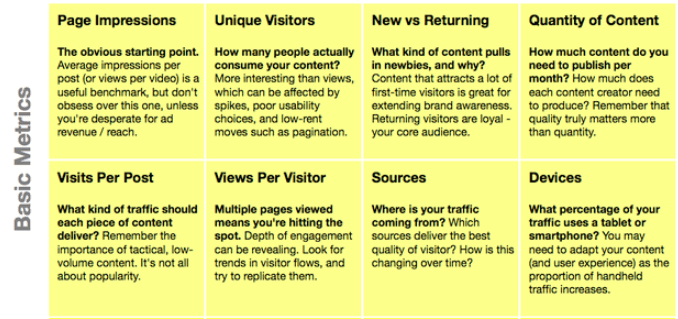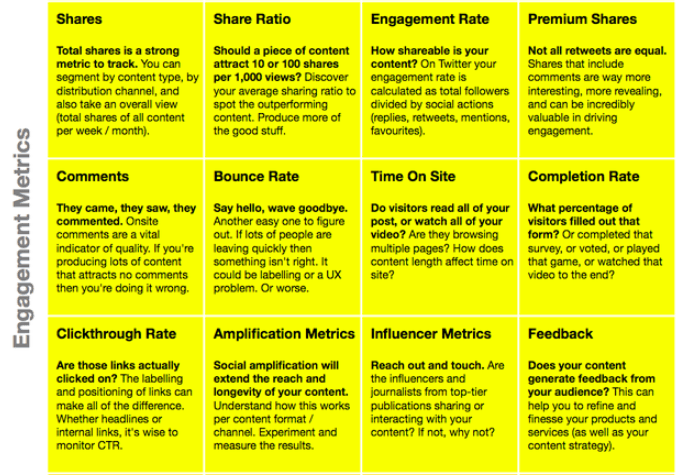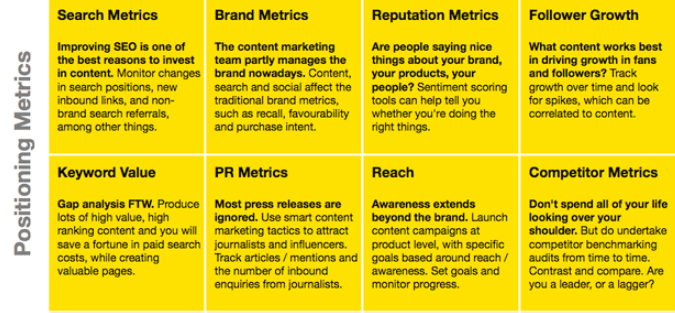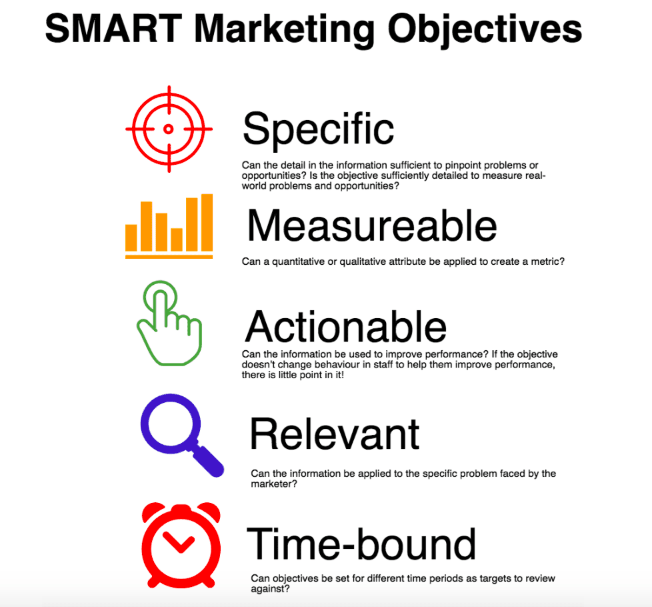Article's Content
While B2B SaaS marketers realize the significance of content marketing, they often find themselves in a tight spot when it comes to justifying their efforts and demonstrating the ROI.
Raise your hand if you’ve been there yourself.
We at Foundation have seen many B2B brands struggle with this challenge before they approach us.
While these companies realize that developing thoughtful, engaging content is essential, they often treat the measurement side of content marketing like a stepchild.
Two reasons:
They don’t know what to measure 👎
They don’t know how to measure it 👎
We get it: With so many metrics out there, it can be very difficult to suss out which metrics to measure and which to ignore.
Clearly, something needs to change!
What Are Content Marketing Metrics & Why Do They Matter?
Content marketing metrics are measurable values that can be used by marketers to measure and demonstrate the effectiveness of their content marketing efforts.
Content marketing metrics help B2B businesses evaluate the progress of their campaigns and see where improvements need to be made.
My research on the topic has yielded a list of 50+ metrics that B2B SaaS businesses can track: keyword ranking, scroll depth, domain authority, unique page views, traffic per channel, number of subscribers…the list goes on.
Don’t believe me? Here’s a list of content marketing metrics by Econsultancy.
They list basic metrics…

…engagement metrics…

…and positioning metrics.

Whoa—that’s a lot!
So does that mean that your B2B business needs to track ALL of these content marketing metrics?
Changing The Debate About Content Marketing Metrics
Which content marketing metrics should you focus on, and which ones can you afford to ignore? The industry is divided into two groups here:
A segment of marketers believes that we should focus on metrics that matter and skip vanity metrics:
We try to focus less on ‘vanity metrics’ like the total number of page views, and more on the metrics that are directly tied to revenue
says Biron Clark from Careersidekick.com.
He has a legit point.
But other marketers talk about looking at ALL content marketing metrics.
BuzzFeed director of data science Ky Harlin, for example, explains that all data is useful and there is no “magical” metric:
You’re almost better off doing nothing than focusing on just one single metric because you’re just very prone to false conclusions.
A company that’s known for success with content can’t be lying, right?
If your head hurts, we feel you. The Chrissy Teigen fan in me looks like this:
Clearly, it’s time to change the debate about content marketing metrics and offer advice that’s practical rather than confusing.
In our opinion, B2B SaaS marketers should look at all the metrics but prioritize the ones that align with their business goals and content objectives.
Let’s look at how you can incorporate this approach in your company’s content marketing strategy.
Step 1: Identify Goals & Objectives
To ensure that you are tracking the right metrics for your business, you need to first list your goals and objectives. This is an essential step that gives you a direction from the outset and helps you make necessary adjustments at a later stage.
Remember: A goal can have multiple objectives and therefore multiple KPIs.
Here’s a list of common B2B SaaS marketing goals and SMART objectives:
- Brand Awareness— Grow Facebook Community by 100% by the end of 2020
- Lead Generation— Increase MQLs by 30% by the end of Q3
- Improved Conversion— Increase lead conversion rate by 30% from content marketing.
- Customer Retention— Increase NPS score by 75% across product category by Q4.
As you can see, there are a number of goals that a business might expect from its content marketing efforts, but marketers should ensure that the goals are specific, measurable, attainable, relevant and timely. Businesses that set vague goals often don’t see success; however, a SMART framework can offer concrete guidance.

Step 2: Align Objectives With Metrics
We’ve listed what could be a B2B company’s goals and objectives above. Once they what they are, Marketers can then develop clear KPIs for each of the above objectives.
So for a SaaS business that wants to grow their Facebook community by 100%, the key metric could be the number of new likes on the page, or the number of comments on each post, etc.

Likewise, a SaaS business whose objective is to boost lead conversion by 30% can look at a metric like cost per action (CPA) for a content asset like a whitepaper download or a subscription.

What To Know Before Measuring Your Content Marketing Metrics
Here’s something you need to know before you go ahead and start measuring your content marketing metrics.
Metrics Don’t Always Show The Whole Or True Picture
Can metrics be rigged? The answer is yes. I’m not talking about metrics like the number of ebook downloads or the amount of blog traffic, but metrics like upvotes and social shares—things that can be influenced by external sources—may not show the real picture of your content’s success.
So what happens when metrics lie? According to Ryan Cooke, tech lead at Pinterest, when you rely on bad metrics, you make bad decisions. Ryan shares his insights in the video below, and while he talks about metrics that aren’t essentially related to content marketing, he does show that metrics don’t always paint an accurate picture:
Content Marketing Metrics Are Complicated
Why do we say that? Let’s look at the image below before I expand on this point:

Content marketing metrics can truly help you find answers to the questions on the right—is the content aligned to sales? Will it generate leads and revenue? Has it worked in the past?
But when we look at the questions on the left, metrics may not always offer a clear picture. How will it make your audience feel? Well…metrics might not be able to tell you.
That’s why we say that metrics are complicated.
Wrapping It Up
Is your content marketing paying off? Are you measuring the ROI of your content correctly? More importantly, are you measuring the right content marketing metrics?
Every business is unique, and so is its goals and objectives—that’s why instead of focusing on popular metrics or tracking them all and hoping you learn something, it is best to prioritize the metrics that align with your B2B company’s goals and content objectives.
Which metrics are important for your company’s success? Which content marketing metrics are you prioritizing? What approach has worked the best for you? Share with us in the comments below.








